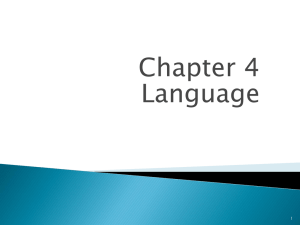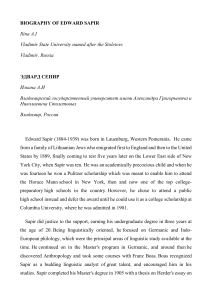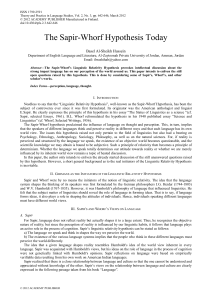Sapir-Whorf Hypothesis: Language & Thought
advertisement
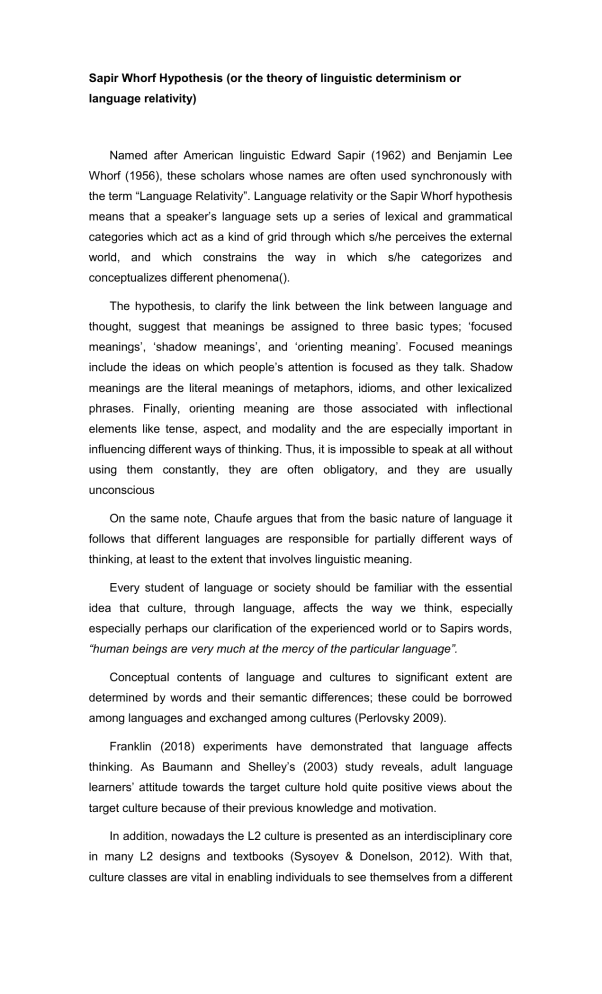
Sapir Whorf Hypothesis (or the theory of linguistic determinism or language relativity) Named after American linguistic Edward Sapir (1962) and Benjamin Lee Whorf (1956), these scholars whose names are often used synchronously with the term “Language Relativity”. Language relativity or the Sapir Whorf hypothesis means that a speaker’s language sets up a series of lexical and grammatical categories which act as a kind of grid through which s/he perceives the external world, and which constrains the way in which s/he categorizes and conceptualizes different phenomena(). The hypothesis, to clarify the link between the link between language and thought, suggest that meanings be assigned to three basic types; ‘focused meanings’, ‘shadow meanings’, and ‘orienting meaning’. Focused meanings include the ideas on which people’s attention is focused as they talk. Shadow meanings are the literal meanings of metaphors, idioms, and other lexicalized phrases. Finally, orienting meaning are those associated with inflectional elements like tense, aspect, and modality and the are especially important in influencing different ways of thinking. Thus, it is impossible to speak at all without using them constantly, they are often obligatory, and they are usually unconscious On the same note, Chaufe argues that from the basic nature of language it follows that different languages are responsible for partially different ways of thinking, at least to the extent that involves linguistic meaning. Every student of language or society should be familiar with the essential idea that culture, through language, affects the way we think, especially especially perhaps our clarification of the experienced world or to Sapirs words, “human beings are very much at the mercy of the particular language”. Conceptual contents of language and cultures to significant extent are determined by words and their semantic differences; these could be borrowed among languages and exchanged among cultures (Perlovsky 2009). Franklin (2018) experiments have demonstrated that language affects thinking. As Baumann and Shelley’s (2003) study reveals, adult language learners’ attitude towards the target culture hold quite positive views about the target culture because of their previous knowledge and motivation. In addition, nowadays the L2 culture is presented as an interdisciplinary core in many L2 designs and textbooks (Sysoyev & Donelson, 2012). With that, culture classes are vital in enabling individuals to see themselves from a different point of view (Bilal Genc & Erdogan Bada, 2005). Pulverness (2004) stresses this point by stating that just as literature ostracizes the familiar object of the self. Through the use of language, we can give a part of culture that can be lived (Boyer 2000). Hence, Language itself is shaped by shared thoughts and experiences. Dungag intro Human beings do not live in the objective world alone, nor alone in the world of social activity as ordinarily understood, but are very much at the mercy of a particular language which has become the medium of expression for their society. It is quite an illusion to imagine that one adjust to reality essentially without the use of language and that language is merely an incidental means of solving specific problems of communication or reflection. The fact that the matter is the ‘real world’ is to large extent unconsciously built upon the language habits of the group. No two languages are ever sufficiently similar to be considered as representing the same social reality. The worlds in which different societies are district worlds, not merely the world with different labels attached. We see and hear otherwise experience very largely as we do because the language habits of our community predispose certain choices of interpretation. (Sapir 1958) Social Approval Man is a social being whose economy is submerged in his social relationship. People accrues social approval by regularly engaging in positively perceived behaviour (Vergne, 2012; Zavlyalova et. al. , 2012). In contrast, low levels of social approval are reflected in external accounts of praise, such as positive media coverage (Facebook post going viral), institution endorsements, and placement on popular social list or ranking (Vergne 2012). Speech Acts


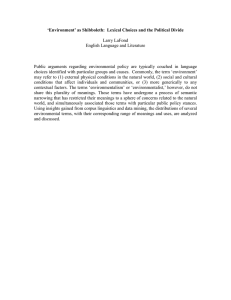
![Edward Sapir [1884-1939] - Frostburg State University](http://s2.studylib.net/store/data/005569801_1-deb1132f1ae8f0e8d561247b81673874-300x300.png)
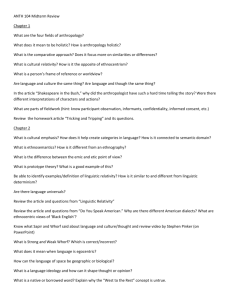
![Word Study [1 class hour]](http://s3.studylib.net/store/data/007905774_2-53b71d303720cf6608aea934a43e9f05-300x300.png)
